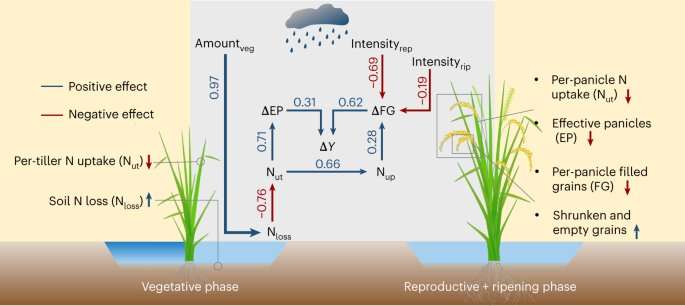May 8, 2023 report
This article has been reviewed according to Science X's editorial process and policies. Editors have highlighted the following attributes while ensuring the content's credibility:
fact-checked
peer-reviewed publication
trusted source
proofread
Rice fields at risk from extreme rain due to climate change could threaten global food supply

A study led by researchers at Peking University in China suggests that extreme rainfall will significantly threaten global food production due to climate change and the accompanying extreme weather events.
The paper, "Extreme rainfall reduces one-twelfth of China's rice yield over the last two decades," published in the journal Nature Food, used long-term weather observations and multi-level rainfall manipulative experiments to explore the magnitude and mechanisms of extreme rainfall impacts on rice yield.
The study found reductions due to extreme rainfall were comparable to those induced by extreme heat over the last two decades, projecting up to 8.1% in lost yield by the year 2100. Jonathan Proctor has published a News & Views article in the same journal issue discussing the study.
Researchers designed a comprehensive series of conditional rainfall experiments to isolate the mechanisms related to extreme rainfall impacts. In the experiments, four rainfall levels of intensity and event frequency were used to observe the impacts on three different growth phases; vegetative, reproductive, and ripening.
Under various conditions of rain intensity, water volume, plant exposure and nitrogen manipulation, with multiple controls, the researchers could differentiate biophysical and biochemical mechanisms operating on distinct growth phases.
Extreme rainfall with high intensity damaged plant tissues directly in some instances. In other scenarios, high-volume rain limited nutrient uptake by washing out or waterlogging soil. There was also a clear sign that during the reproductive phase extreme rainfall was preventing successful pollination.
Rainfall simulations across China showed that physical disturbance induced by extreme rainfall was the most critical yield determinant across 47% to 95% of rice sowing areas, accounting for approximately an 8% reduction in yield already, separate from the projected 8.1% reduction by the end of the century. The authors suggest that future farmers of China could choose areas to sow that will be less affected by increases in extreme weather events.
A substantial percentage of humans live in China, with more than 18% of all humans calling it home. Conditions that affect the food supply of China have wide-ranging impacts on economies, agriculture and water usage around the world.
China currently imports rice from Vietnam, Pakistan, India, Burma, Thailand and is Asia's largest buyer of California rice. Each of these regions will have their own issues with crop yield due to a changing climate, so understanding the mechanisms behind these impacts helps all producers better prepare for an agricultural future that is changing along with the climate.
More information: Jin Fu et al, Extreme rainfall reduces one-twelfth of China's rice yield over the last two decades, Nature Food (2023). DOI: 10.1038/s43016-023-00753-6
Jonathan Proctor, Extreme rainfall reduces rice yields in China, Nature Food (2023). DOI: 10.1038/s43016-023-00757-2
Journal information: Nature Food
© 2023 Science X Network





















